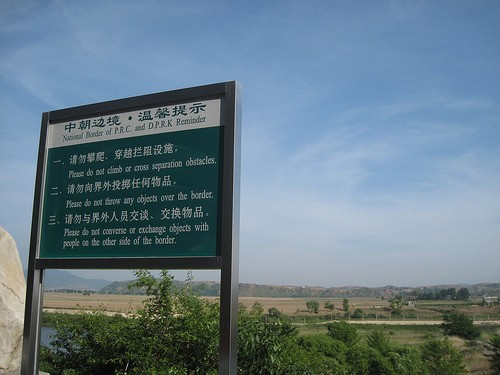Kim Jong-Un is Probably Alive, But Record Numbers of North Koreans Visiting China

Amidst unsubstantiated rumors on Chinese social media that the leader of North Korea, Kim Jong-un, was assassinated Friday morning in Beijing, it is nonetheless a fact that more North Koreans are legally visiting China than ever before.
The Yonhap news agency of South Korea reported that 152,300 North Koreans went to China in 2011 -- a record number, and 31 percent above the figure from the prior year -- primarily for employment, business or leisure purposes, citing data from the China National Tourism Administration.
Almost half of the North Korean visitors were middle-aged between the ages of 45 and 64. Moreover, the vast majority, 130,472, were men.
According to Voice of America, the previous record high was 125,800 in 2005.
However, the official tourist and government agencies did not report what is believed to be a much larger traffic of cross-border travel between China and North Korea involving illegal immigrants and smugglers.
North Korean border troops routinely kill would-be refugees trying to flee the isolated, poverty-stricken Communist state.
According to a 2010 report in the Daily Telegraph newspaper, thousands of illegal immigrants from North Koreans are believed to be working on farms and building sites in northeast China.
Migration Information (MI) once noted: “North Korean migration to China is also largely a result of economics, namely the calamitous condition of North Korea's economy. The main factor is the country's international isolation… and the international community's criticism of [the Communist] regime. North Korea's failed economic system and natural disasters, including flooding and droughts in the 1990s, have made the situation worse.”
MI also indicated that the legal status of North Koreans who illegally enter China is not clear.
“The [Chinese] media has called them ‘defectors’ while human rights groups and the US Congress have labeled them ‘refugees’ and ‘asylum seekers;’ the Chinese government says they are ’economic migrants,’ MI said.
“North Koreans who are forcibly repatriated may face political persecution, but they have economic incentives for risking their safety and that of their families back home. Since the international community has not reached a consensus on this question, no one knows what rights these North Koreans can claim and what legal obligations China, North Korea, and other countries have towards them.”
MI added that it is impossible to estimate the number of illegal North Koreans residing in China.
“There are no reliable statistics on how many North Korean migrants live and work in China, though estimates range from an unrealistically high one million to the more probable numbers of 200,000 to 250,000,” the group wrote.
“Even estimates are difficult to establish, much less verify, as migrants fear exposure and the Chinese authorities lack control over their comings and goings.
North Korean migrants encounter a multitude of problems once they arrive in China.
“North Koreans face labor exploitation, mental and physical abuse, and even indentured servitude,” MI noted.
“Under constant fear of exposure and arrest, North Korean migrants earn a meager living in agriculture, construction, and housework. There have been reports of young North Korean women who are forced into prostitution and face sexual abuse. They do not report their cases because they fear exposure and arrest by the authorities. Some North Koreans, including young children, have been going back and forth across the border, bringing food, other daily necessities, and money to their hungry families at the risk of capture by North Korean border guards.”
Must Read: Kim Jong-un Dead or Not: Top 10 Celebrities Death Hoax on Twitter (PHOTOS)
© Copyright IBTimes 2024. All rights reserved.





















